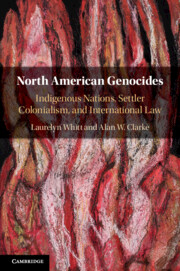Book contents
- North American Genocides
- North American Genocides
- Copyright page
- Dedication
- Epigraph
- Contents
- Preface
- Acknowledgments
- Introduction
- Chapter 1 North American Genocide Denial
- Chapter 2 The Legal Case for North American Genocides: a Retrospective Methodology
- Chapter 3 Settler Colonialism and Indigenous Nations
- Chapter 4 A Legal Primer for Settler Colonial Genocides
- Chapter 5 The Beothuk Nation (1500–1830)
- Chapter 6 The Powhatan Tsenacommacah (1607–1677)
- Chapter 7 The Conventional Account of Genocide: from a Restrictive to an Expansive Interpretation
- Chapter 8 Toward an Account of Systemic Genocide
- Appendix Convention on the Prevention and Punishment of the Crime of Genocide
- Index
Chapter 1 - North American Genocide Denial
Published online by Cambridge University Press: 12 July 2019
- North American Genocides
- North American Genocides
- Copyright page
- Dedication
- Epigraph
- Contents
- Preface
- Acknowledgments
- Introduction
- Chapter 1 North American Genocide Denial
- Chapter 2 The Legal Case for North American Genocides: a Retrospective Methodology
- Chapter 3 Settler Colonialism and Indigenous Nations
- Chapter 4 A Legal Primer for Settler Colonial Genocides
- Chapter 5 The Beothuk Nation (1500–1830)
- Chapter 6 The Powhatan Tsenacommacah (1607–1677)
- Chapter 7 The Conventional Account of Genocide: from a Restrictive to an Expansive Interpretation
- Chapter 8 Toward an Account of Systemic Genocide
- Appendix Convention on the Prevention and Punishment of the Crime of Genocide
- Index
Summary
Two signal events occurred in 2014 – one in Canada and one in the United States – that bring home why it is worth attempting to determine whether the crime known today as genocide occurred in North America over the course of its colonization. On the face of it, they have little in common: one is the opening of a new museum north of the Canada–U.S. border, the other is an anniversary to the south. Yet they both speak eloquently not only to the role of power in shaping how history is told and how it acquires the status of knowledge, but also to how memory, and the vigilant refusal to forget, can challenge – and resist – this process. As a recent book exploring the phenomenon of hidden genocides observes “[t]he blood of the victims whose deaths do not matter to the living is just blood in the sand … The blood of those who matter to the living will be remembered.”
- Type
- Chapter
- Information
- North American GenocidesIndigenous Nations, Settler Colonialism, and International Law, pp. 8 - 25Publisher: Cambridge University PressPrint publication year: 2019

